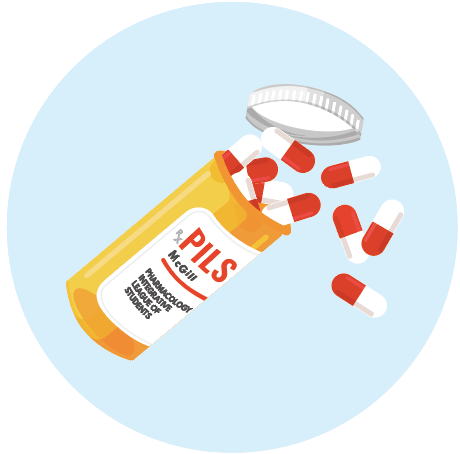Why do research? ⋆ ★
- Get to know the field of pharmacology and nicher subjects
- Explore what it’s like to work in academic research
- Learn academic skills like technical writing, literature searches, and how to read and write a paper
- Learn transferable wet lab skills and data analysis
- Build your resume for grad school, med school, or industry applications
- Put your education to use for sick science!
How to get involved? ⋆ ★
There are multiple ways to be involved with research at McGill, but specifically in pharmacology, you have four options:
- PHAR 396/7
- Honours Research Project
- NSERC (Natural Science and Engineering Research Council) —through the through Medicine/Health Sci department
- SURA (Summer Undergraduate Research Awards)
- Independent arrangements
⋆ ★ How to get started
Pick an area of interest within the field—or just start browsing!
Look through faculty and their research on the pharmacology website
Make a list of professors whose work interests you and reach out via email!
- Don’t limit yourself JUST to McGill professors! There are many experienced and interested researchers in other nearby academic institutions and hospitals!
- Once you’ve gotten their approval, you’re probably going to have an interview!
Drafting the email:
- Decide your intentions—do you want to do a 396 course? an honours project? NSERC, SURA, or just volunteer work?
- The kind of work you want to do determines when you should start contacting professors and the requirements you might need
- For NSERC/SURA, deadlines registration with your supervising professor for Pharmacology are in Februrary
- For 396 courses, deadlines are around add/drop period, but you will need to find a supervising professor and contact the course coordinator Dr. Jason Tanny before then
- For independent projects or general volunteer work, reach out and see where it goes!
- Do your research on your potential supervisor’s work
- It’s important to make sure your interests align with their projects, and this will help you write a good email! Mention your interest in the field they are involved in — it helps to read any recent papers they have come out with so this shows the Professor where your interests lie best!
- Draft an email—here is a good resource on how to do that
- Protip: include your unofficial transcript in your first email if you’re proud of your GPA and/or want to show that you’ve taken the relevant courses, or else send it after you’re asked for it
- Note any past research experience/any experience within your field of interest that you’ve had! And if you don’t, fret not, just show your willingness & ability to learn!
- Wait for a response—profs are super busy and it may take up to a week for them to get back to you. Feel free to send a follow-up email after a week or two in case your email got lost in their inbox.
Email DO’s:
- DO address them professionally by name
- DO keep it short and sweet
- DO your research on their work and state specific interests you have in their lab
- DO state relevant coursework and experience
- DO include unofficial transcripts and CVs if you think they will help
Email DON’Ts:
- DON’T send generic mass emails
- DON’T send paragraphs or long love letters
- DON’T email lots of professors all in one round
- DON’T take on a project you’re not interested in

